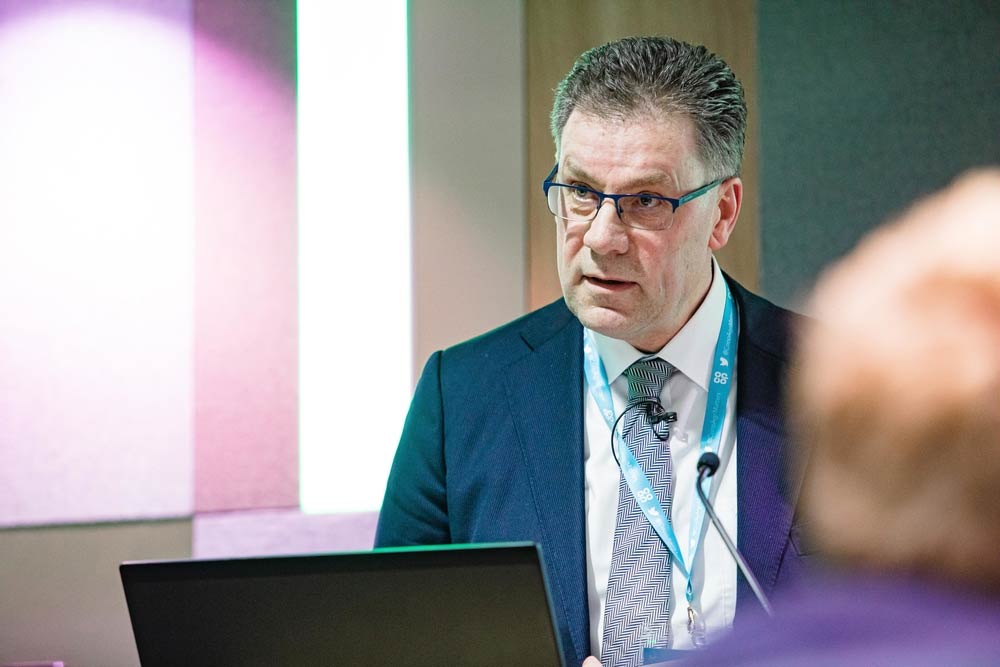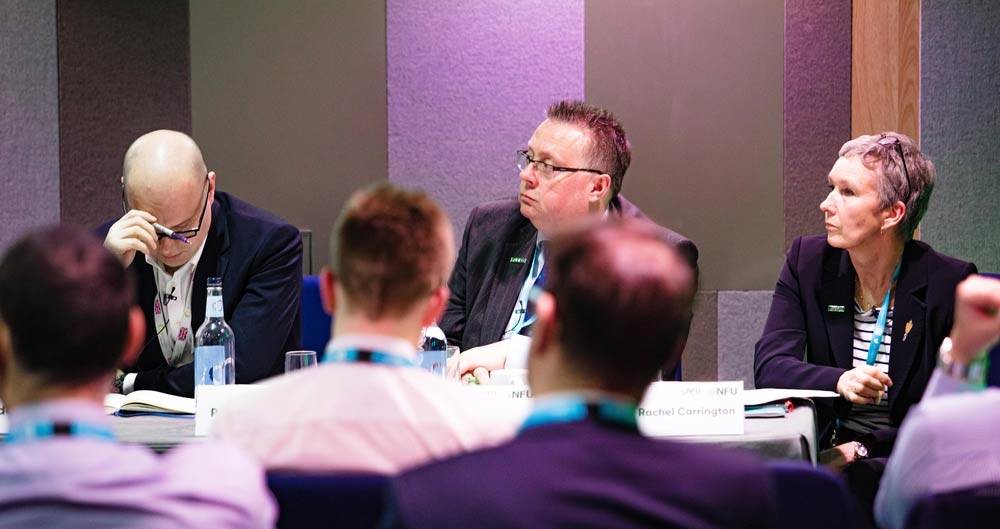- Dirk de Lugt, chair of Royal Cosun (the Dutch beet growers cooperative)
- Paul Kenward, managing director, British Sugar
- Michael Sly, NFU Sugar Board chairman, NFU Sugar
Chaired by: Rachel Carrington, East Anglia regional director, NFU
The innovative work being undertaken into alternative uses for sugar and sugar beet in the Netherlands to maximise the crop’s potential, and the implications this work could have for the UK sugar sector, was the focus of the 2020 NFU Sugar breakout session.
Dirk de Lugt, chairman of the Dutch beet growers’ cooperative Royal Cosun, told the session about the research they have been doing. It focused on processing leaves from harvested beet to produce vegetable proteins for use in a range of food and drinks, as well as work on the production of bioplastics which can help reduce reliance on plastics produced from fossil fuels.
Unlike the UK sugar industry, where NFU Sugar represents the growers and British Sugar processes the sugar, Royal Cosun is a cooperative with 9,000 members responsible for growing and processing sugar in the Netherlands.
Mr de Lugt emphasised the ‘circular economy’ Royal Cosun prided itself on – growing the beet, processing it, and producing a wide range of co-products, as well as undertaking innovative research at its dedicated research and development facilities looking at adding more value to the crop.

Pictured above: Dirk de Lugt, chairman of the Dutch beet growers’ cooperative Royal Cosun
This innovative research was the main focus of Mr de Lugt’s presentation, beginning with how Suiker Unie, a unit within Royal Cosun, has become the largest producer of green gas in the Netherlands. It operates three biomass fermentation plants, as well as a bioethanol producing facility.
Mr de Lugt also spoke about how Royal Cosun has been working on bioplastics to enable the production of more environmentally friendly plastics that are not made from fossil fuels and plant-based protein. The leaves from sugar beet would usually be mulched back into the soil during harvest, or occasionally used for animal feed, but Royal Cosun has been collecting these leaves and processing them to extract the protein within them. This protein has excellent gelation properties and can be used in foods as an alternative to animal proteins, and extract more value for the grower, he explained.
With climate change an ever-increasing concern for society, Mr de Lugt told the session sugar beet was an excellent crop for reducing carbon dioxide in the atmosphere and was more effective than sugar cane because it required less land and considerably less water for its production because of the irrigation necessary for cane production.

Paul Kenward, managing director of British Sugar, told the session how British Sugar has ambitious plans to reduce its impact on the environment. Since 2014, British Sugar had reduced its carbon dioxide emissions by 18 per cent, its energy usage by 12 per cent and its water usage by 26 per cent.
Michael Sly, chairman of the NFU Sugar Board, said the circular economy concept where the sector produced biogas, digestate that could then be used to help improve soil health on farms, and vegetable-based protein from leaves were exciting things for the UK industry to look at.
With issues caused by the ongoing flooding a significant concern for many growers, Mr Kenward said British Sugar had already extended the harvest campaign length at Wissington and Newark. Mr Kenward said that British Sugar planned to keep the Newark factory, around which growers had been hit hardest by the weather, open into the first week of April to allows growers to get their beet to the factory.
More from NFU Sugar:
- NFU Sugar and British Sugar joint statement: End of campaign beet deliveries
- Current campaign data
- Sugar Board election results
See more of our coverage from NFU Conference 2020:
- NFU elects officeholder team
- NFU20: British farm standards must be the benchmark in future trade deals
- NFU20: Defra Secretary George Eustice talks flooding, ELMs and food standards
- NFU20: Business backs British standards
- NFU20: How we are inspiring our nation's schoolchildren
- NFU20: Leicestershire farmer honoured for grassroots commitment
- NFU20: Safeguarding our food and farming standards
- NFU20: Climate change is the challenge of our time
- NFU20: Putting IPM at the top of the agenda
- NFU20: Beyond the CAP - the future of farm support
- NFU20: Animal health and welfare - protecting and improving our reputation
- NFU20: Psychological impacts highlight the importance of combating rural crime
- NFU20: How can technology break through the barriers facing the arable sector?
- NFU20: An ambition for growth in horticulture
- NFU20: Learning lessons for the UK's sugar beet production
- NFU20: Livestock session busts myths on meat
- NFU20: Poultry's positive position to farm without barriers
- NFU20: Promoting, growing and protecting British dairy
In case you missed it, here are some easy ways to catch up with the highlights from both days at the ICC, Birmingham:
